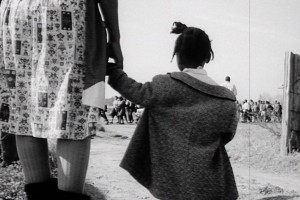 As the black community overwhelmingly celebrates the re-election of our first black President, I’ve been surprised to note how few of us are aware of another groundbreaking rise to higher office achieved by one of our own. This office is pastoral, not political, yet the social implications of this occurrence are perhaps no less significant than that of President Obama’s election to the office of President of the United States. I’m talking about the Reverend Fred Luter, Jr. and his own election as president of the Southern Baptist Convention.
As the black community overwhelmingly celebrates the re-election of our first black President, I’ve been surprised to note how few of us are aware of another groundbreaking rise to higher office achieved by one of our own. This office is pastoral, not political, yet the social implications of this occurrence are perhaps no less significant than that of President Obama’s election to the office of President of the United States. I’m talking about the Reverend Fred Luter, Jr. and his own election as president of the Southern Baptist Convention.
The Southern Baptist Convention, (S.B.C.), for those who don’t know, is the largest body of Baptists in the entire world. It is the second largest Christian body in the United States with 16 million members, second only to the Catholic Church. Given that most American Christians are Protestant, you could argue that Fred Luter, Jr., a 56-year old black man from New Orleans, stands as the most powerful religious figure in America. This is a significant fact in its own right. But it’s all the more amazing when you consider the history of the Southern Baptist Convention.
The S.B.C. has an old and venerable history in the United States, and particularly in the south. But to say that the S.B.C. has a questionable history with respect to race would be putting it mildly. It became the Southern Baptist Convention in the first place in 1845, having split with the northern Baptists because it refused to prohibit slave holding churches from sending out missionaries. Though the Baptist community even in the south had a history of racial tolerance and acceptance towards blacks throughout the 1700’s (even allowing blacks to be preachers in the south and opposing slavery), the southern Baptists gradually changed their attitude towards slavery as their membership expanded among the elite, wealthy planter class of the Southern Gentry. (Perhaps ironically, conversions of blacks in the south increased significantly as well during this time, especially among the slaves. Black Baptists formed their own organizations after the Civil War, most notably the National Baptist Association.) From that time onward, and even after the Civil War, the attitudes of Southern Baptists with regards to civil rights closely tracked that of white Southerners generally. Conservative Southern Baptists would support Jim Crow laws (though there was a moderate faction that favored desegregation) and were generally not allies of the Civil Rights Movement.
All this of course makes the election of Fred Luter, Jr. to the presidency of the S.B.C. (he was elected unopposed by the delegates at the convention; itself a first in S.B.C. history) all the more striking. A jovial yet fiery personality behind the pulpit, the senior minister of the Franklin Avenue Baptist Church in New Orleans Reverend Luter was born the third of five children and raised by his divorced mother who made ends meet as a seamstress and as a surgical scrub assistant. He turned to God at the age of 21 after a motorcycle accident nearly killed him, leaving him with a head injury and a compound fracture. He began as a street preacher and ultimately found his way to Franklin Avenue in 1983, ultimately leading the growth of the church to 7,000 people prior to Hurricane Katrina in 2005; after which Reverend Luter was noted for his leadership in rebuilding the congregation following unparalleled devastation left in the Hurricane’s wake, rebuilding a crushed and demoralized congregation back up to a membership of 5,000 as of his election to the presidency of S.B.C in June of last year. He finishes his one year term in June of this year.
If it is a testament to the degree to which minds and hearts have changed over the many generations of this country’s racial history unto now that Revered Luter could be elected President of a body of primarily white Christians with roots deep in slavery and segregation, it is also perhaps a testament to the power of the Christian message of love and forgiveness, even when articulated across the boundaries and tensions of the color-line. Reverend Luter recalled having been invited to preach at a Baptist church in Crowley, Louisiana, in the early ’90’s (the first time he preached outside of New Orleans). It was a strictly white congregation, and the pastor who invited Reverend Luter to speak had become nervous about how his congregants would react to a black preacher.
“Just don’t put my picture up,” Luter instructed him, preferring to leave it a surprise. Indeed his audience was silent and tense when Fred Luter astonished them with his presence. But then he spoke of the grace and the goodness of God in the warm, approachable manner for which he is known. Their attitudes changed even that night. One woman from the crowd would approach Reverend Luter afterwards, admitting to him that she had begun by feeling angry that a black man was preaching at her church…and ended by thanking God he came.
 In this episode KC, Chris, John, Darius, Leisha, and Rasaan discuss the many struggles that we as blacks experience, including who can and cannot publicly speak on it, the language we use, our leadership, and infrastructure.
In this episode KC, Chris, John, Darius, Leisha, and Rasaan discuss the many struggles that we as blacks experience, including who can and cannot publicly speak on it, the language we use, our leadership, and infrastructure.



